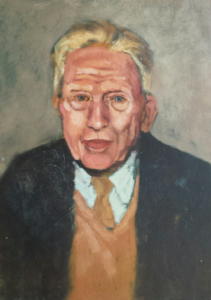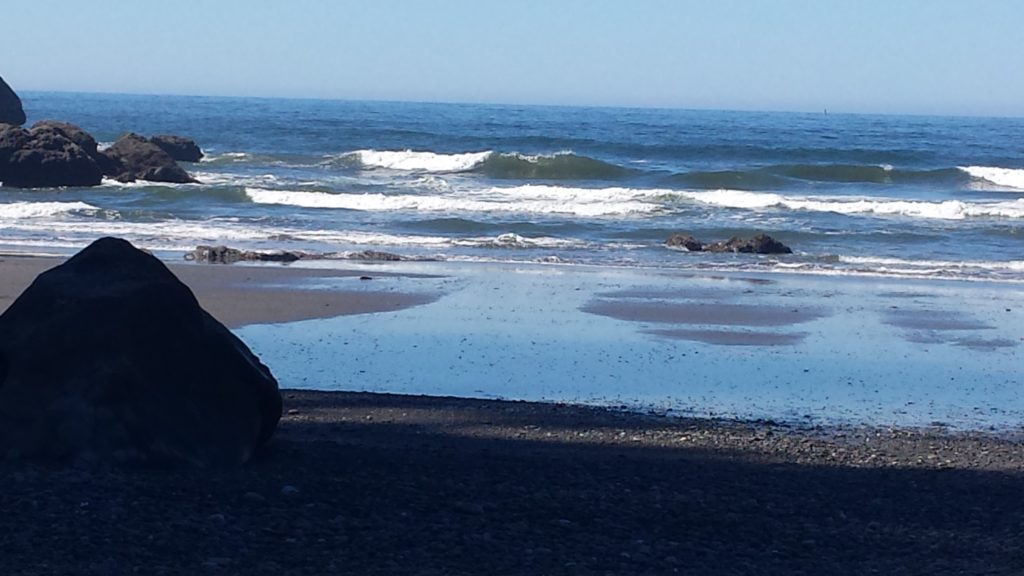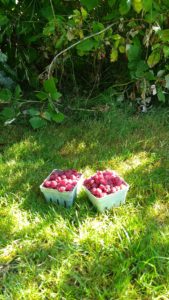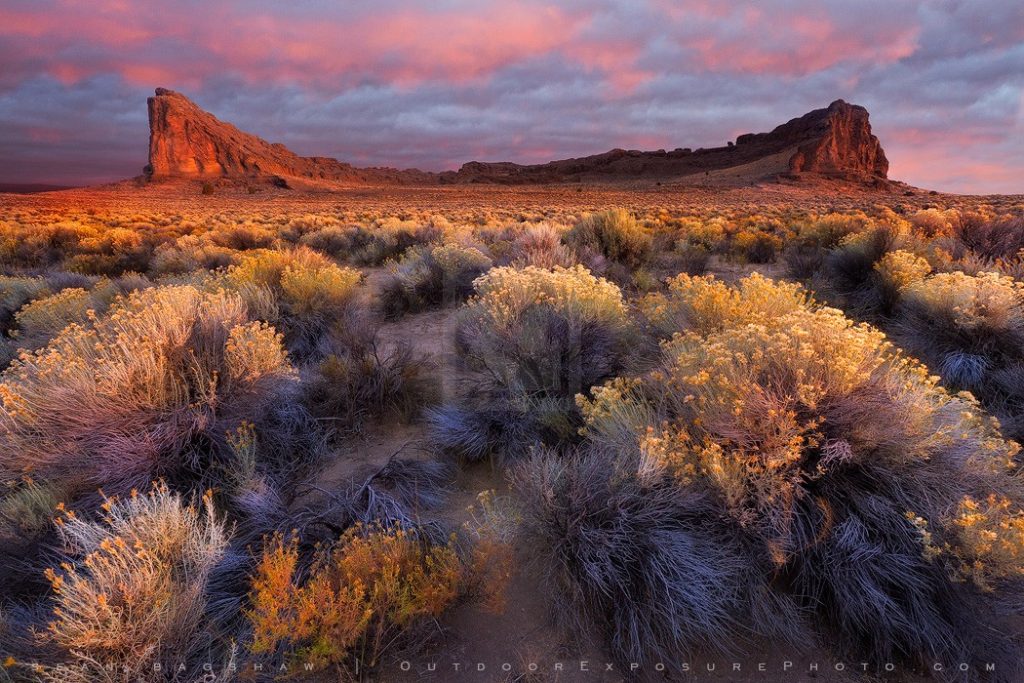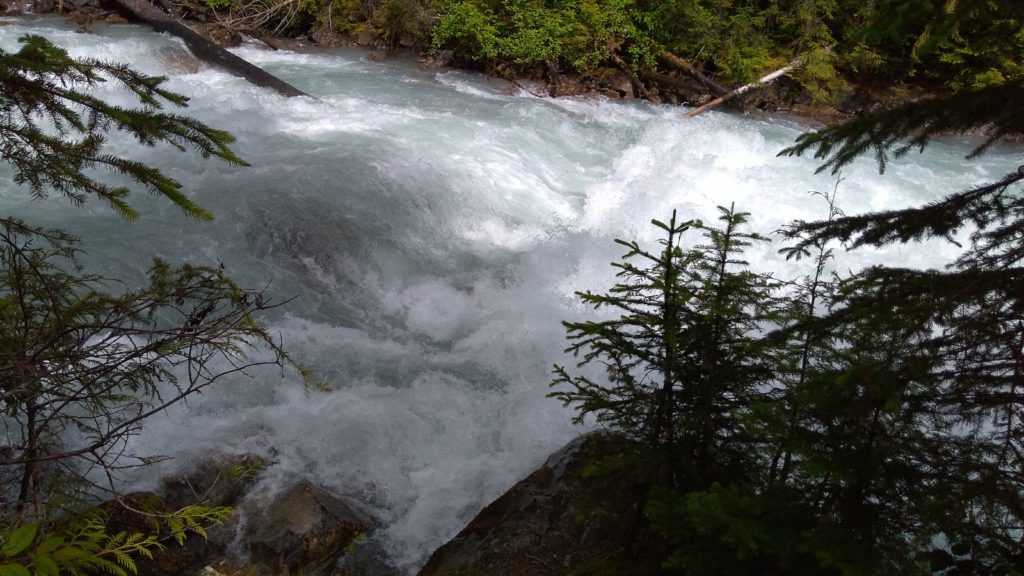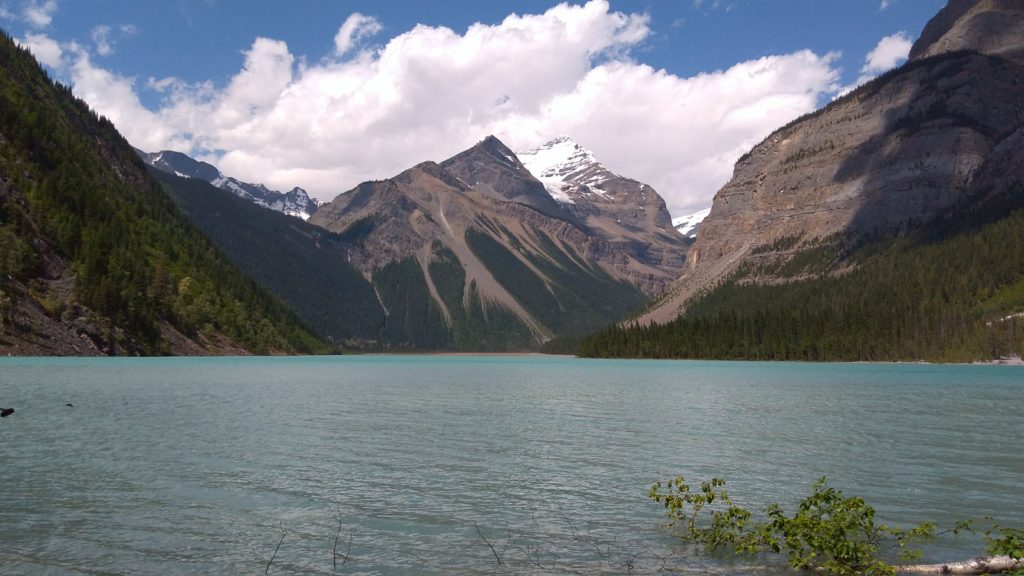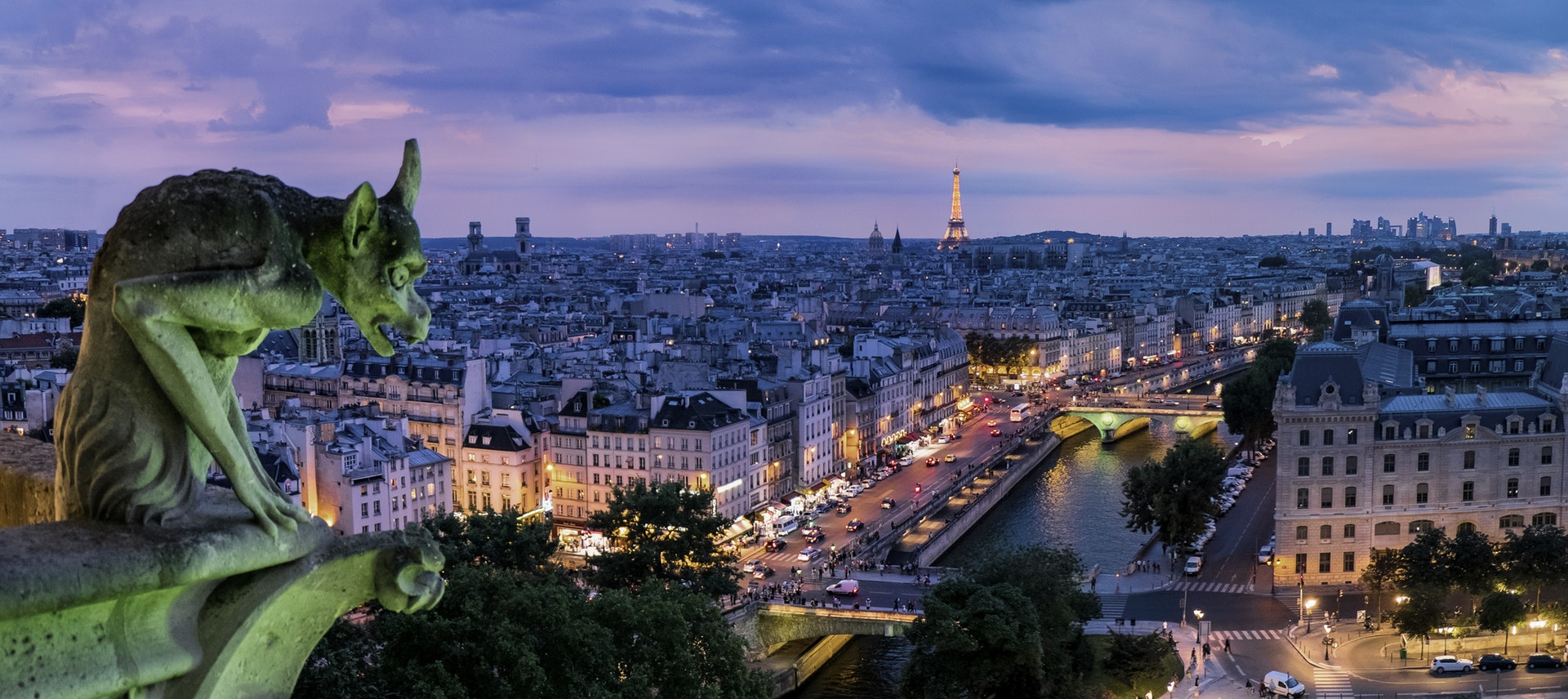
Today is Bastille Day.
I will tell you a story of a long ago Bastille Day in Paris the summer after the massive anti-capitalism and antiwar demonstrations and strikes of 1968.
When I think of France I normally don’t think of Paris, busy, noisy, beautiful Paris, but today I’ll speak of a time in Paris when reality roiled its back like a sea monster briefly breaking above the water, creating storm waves all around.
She was eighteen, with blondish hair past her shoulders and blunt-cut bangs, a veteran of the 1967 March on the Pentagon, a student of English literature and of French and Russian and with the naive sense that her mind was capable of encompassing everything. Her parents were paying for a trip to Paris as a high-school graduation present, a cultural break before college. She and a friend from high-school had gone to New York together and purchased round trip tickets to London on Icelandic Air. The friend was also eighteen, with hair even longer and blonder than hers. They’d known each other for years but weren’t the most intimate of friends, she having found a consuming friendship with an intense young woman who had moved to their school from Palo Alto. France on Five Dollars A Day in her suitcase and on a strict budget, she and her friend had flown to London with hits of good Owsley acid hidden in their socks, meant to be shared at just the right moment.
Arriving at Heathrow, they’d gone directly to stay with a family in Oxford who knew the friend’s parents well. He was a Don at New College (the older part of Oxford) and the archetype of a cozy English prof, well rounded in body like a well-stuffed armchair, part of the stuffing extruding from his mouth in the form of upper-crust British English, full of overfed vowels, almost impossible to comprehend but occasionally well worth the heightened effort.
His wife was charmingly hostesy, and his grandchildren, all golden curls and perfect manners, made them feel they’d walked into a delightful post-Victorian Era British children’s book, especially when the children were released by their grandmother for “a romp in the garden” with the two friends. They went punting and picnicking on the Cherwell, a tributary of the Thames, where she dutifully made the rookie error of following the punting pole into the river, drying off in the sun on the river bank where they ate the things from the beautifully packed picnic basket. She learned how to say “boot” instead of trunk, and “strawbs” instead of “strawberries” and managed to choke down meat pies for the first time in her life.
From there, they took a train and then a boat across the Channel where they began their adventures by hooking up with a good-looking “older” man in his twenties who already worked as a journalist. They were intrigued by his aura of left-wing professionalism and his dual Greek and British passports.
They disembarked in Callais as the largest darkest orange full moon she’d ever seen rose over the tree-lined roads, golden fields of grain and red poppies spreading out on both sides. They camped in a tent with their new friend, putting up with some fairly gentlemanly groping, he trying to convince them to join him in Spain where he was headed for an extended vacation. They refused, feeling in part still dutiful and in part, even in their innocence, divining what a good thing he thought he’d found with two young American girls, perhaps eventually willing.
In the morning, he drove them into Paris in his Renault and deposited them in front of their student pension on the Left Bank on Rue des Ecoles where they’d somehow managed to rent a room for a month. They were enrolled in the summer French Intensive course for Foreigners at the Sorbonne, a process accomplished in those days totally by correspondence. They shared a room on the third floor with french doors opening onto a tiny balcony with iron grillwork. There they could sit on the window sill and watch the life in the street below and become absorbed in the lives of the people in the opposite flats.
They went to classes fairly regularly for a week or so before getting fed up with the slow pace of things. They were learning more French in their adventures around the city, where they went to cafés, wandered endlessly together or alone, shopped in the bookstalls on the quays of the Seine, explored Notre Dame and the Ile de Paris, sat on the quay in the evenings with German students whose big rucksacks were always there to lean on and their near-perfect English an entryway into the easy relationships of youth.
After a while, when they had practically stopped attending classes, they met up one evening with a young Frenchman on the quay. Young and ready for opportunity, he had approached the international group sitting around a guitarist and focused on the two blond women speaking a mixture of English and French. He was from Strasbourg, working-class and adventurous. He impressed the girls by teaching them argot and gallantly buying them a special dictionary of slang from one of the bookstalls.
Michel was his name. He was their age, friendly and easy-going and clearly interested in the friend with long blond hair for more than conversation. They went together to Greek restaurants deep in the Latin Quarter and drank cognacs so late into the evening that the two friend got locked out of their pension more than once. That was when he introduced them to the place where he lived in an Arrondissement on the other side of the river. The apartment where he lived with two other “mecs”, likely Algerians, was in a rough neighborhood. He’d bring back baguettes, butter and milk for breakfast and make them coffee in bowls with heated milk.
It was coming up on July 14th, Bastille Day, the day the two friends had chosen as the occasion special enough to use their smuggled acid. They consulted together about whether they could trust Michel enough to share it. After several days of hesitation, they decided to risk it. Down on the quays, they had all smoked pot with the German students. They knew he was no stranger to mind-altering experiences.
That evening, the three of them sat together on the edge of the quay and discussed the possibility. The two friends were now comfortable enough in their command of French that they were able to communicate some of the subtleties of the situation. As best as they were able, they described the experiences they’d had with acid, trying to give him a basis for a decision about whether it was something he wanted to take on.
In the end, although not without some trepidation, he did. He wondered, as privately did they, how prepared he was for an experience so extremely outside of what he had known growing up in his small town in the north of France. He told them more about what Bastille Day was like in Paris, full of fireworks in the street, parades down the Champs Elysee, crowds of people, parties, dancing, music and street performers everywhere. Everyone excited and happy. Everything festive. Everybody drinking lots of wine. How marvellous it would be with the enhancement of LSD, thought the two friends.
The night before, they slept at Michel’s apartment in the 17th Arrondissement, the two girls on the floor in bedrolls purchased at the Puce. The morning was bright, sunshine filtering in down the air shaft in the middle of the tenement and into the only the small apartment’s only window. They made cafés au lait and shared a baguette and then ceremoniously took the tiny white pills the friends had brought from the States, one each.
The two young women put on their long skirts and sandals and gathered up their passport wallets with enough money for food for the day. They waited as Michel, taking his time, had made sure he had his carte d’identité in his wallet and had combed his hair. Together they set off into the bright sunshine.
As they walked through the Arab quarter of Barbes Rochechouart, the streets were beginning to fill with people off for the holiday, walking in groups or with families, setting off to their favorite cafe to start the day. The atmosphere was relaxed and happy, people at their ease looking forward to spending a festive day together in a city with endless possibilities and endless beauties.
They descended the stairs of the Metro station at Brochant, Michel running ahead and turning to usher the girls down the next flight with a theatrical bow. They glanced shyly at each other as they stood on the platform waiting for the train, communicating without words the intoxication of an experience of the world that was beginning to unfold. Even the expanse of the train station itself felt it held an intimation of how each object, each sight, now contained infinities of beatific interest.
After changing trains several times led through the maze by the savvy Michel, they emerged at the Louvre station, not to brave the pressing crowds of the museum itself, but to begin their day of wandering in sight of the old palace at the Tuilleries.
They walked through the gardens, seeing each familiar sight with total freshness as if its very nature had opened itself for their detailed examination and contemplation. People passed and left their impressions. The play of the children around the fountains took on its proper meaning. They were exhalted.
As the day began to turn to afternoon, they sat in a café with glasses of wine in front of them, mostly unconsumed, speaking to each other occasionally in the flow of all the magic unfolding in front of them in the street. There were mountebanks and fire eaters, street dancers and singers, but the people themselves were the most extraordinary sight. It seemed somehow that a festival of human oddities had begun, with families of giants and midgets, people with facial deformities, the enormously fat and enormously skinny, all gay and splendid in their holiday attire.
They walked again across the bridges, passing through the throngs who were promenading there, some chatting vociferously to each other, others laughing and gesticulating with their arms. They hung on the balustrades and watched the river below for a timeless interlude before crossing to the Ile de la Cité to enter the Cathedral.
What magnificence. They were pulled through the doors into the flow of people towards the center. As if on an island in the middle of a swirling lake, a white and scarlet-robed priest rose above the crowd, intoning words of ritual. The inner walls of the cathedral seemed to vanish. They found themselves immersed in another world, suffused by an incredible light that colored the air itself with jewel-like glow. The smoke of incense rose up into the arches of the heavens above, creating beams of white. They stood entranced at the edge of the gathering as a bell rang repeatedly from the altar, creating reverberations of color and sound throughout the nave. When the big bell of the cathedral itself began its tolling the universe itself was encompassed in the sound.
They were eventually pulled back through the doors to wander the grounds. There they walked on the grass and stone grass under the stupendous stone arches of the flying buttresses. Between the cathedral walls and the river, they became lost together in some zone of wizardry. The air was beginning to scintillate with the colors of the sparklers that passer-bys held and spun in circles with their arms. Fireworks seemed to be coming from everywhere in the sky, sending sparks of light throughout the atmosphere, hovering around people and buildings, swooping like galaxies here and there. Time passed. Wonderful beings went by, singing.
In the midst of it, someone made a decision to climb the tower to see the gargoyles. Somehow directions were sought, money was exchanged and tickets bought. They climbed the long stairs of the north tower to the top to look out over the river and the city and commune with the gargoyles. What creatures they were. Some seemed to have flown tremendous distances in their travels and to have gained enormous wisdom. That afternoon, the three friends stood with them and heard many stories as they rested their heads against their stone wings.
Towards the end of the day, in Michel’s wake, they took the metro to Montparnasse, sat with the singing hoards of students gathered on the steps of Sacre Coeur, and watched the sunset, the city spread out before them. Flowers of color sprouted suddenly as fireworks exploded here and there amidst the sparks of the white street lights. They thought that never before or since has there been such a magnificent sunset or such a joyous choir.
As the darkness began to penetrate into the streets of Montparnasse, they felt the lassitude of evening seeping in through their skins. The effect of the acid was on its downward mellow glide. The comfort of a little food and an apartment where they could relax began to call to them.
Even their young limbs were feeling a bit weak as they set off together again towards the Metro. After a miraculous navigation in the Metro, they were back in the Barbes Rochechouart.
They found a café where they bought some pastries from the case and then some fruit from the corner épicerie open late. They climbed wearily to Michel’s apartment where they put on a Bob Dylan record and stretched out his bed, contentedly munching pastries.
They must have dozed for a while. She woke to a pounding somewhere. Michel was up and moving to the door. The night was black at the window.
As she watched, he undid the locks and opened the door. As he pulled it towards him, a man seemed to slump and fall forward into his arms. Michel caught him around his back in a kind of rough embrace and walked him back into the room, easing the heavy form onto a chair. It was one of his roommates. Some guttural conversation was exchanged in the thick argot of the streets, incomprehensible from where she now sat on the bed, alert and more than a bit unnerved. Michele turned to the two friends, both now fully awake, and said in an excited voice,
“He’s hurt. He’s been stabbed. He’s bleeding from his side.”
Over the next moments, they heard the hurried story of a fight in the streets Michel had so far be able to glean from his friend. Suddenly the door was being pushed open again by the other roommate, hair wet with sweat and shirt torn. He turned and quickly locked and latched the door behind him. There was more hushed conversation. A plan was being made.
The wounded man turned to the two young women groggily and explained in stilted but proper French that the wound was not grave, just painful. He was clearly in shock. Michel explained that the second roommate would take the wounded one to a neighbor’s apartment where he would be safe from the gang who had attacked him. They would wait until morning, evaluate the knife wound and see if a doctor were necessary.
In case the trouble followed his friend to their apartment, Michel thought it best they all leave. They gathered their things and the uneaten pastries and quietly and sleepily left the apartment, taking back streets around the scene of the fight.
It was too early for the Metro. Despite their drowsiness, they decided to walk back towards the girls’ pension on the Rue des Ecoles, where the concierge would not open the door for several hours.
A glow still lingered through the fatigue as they walked. It was mysterious and a bit exciting to be moving through the unfamiliar dark streets back towards the Seine. After what seemed a long and rather weary trek, they found themselves on the Rue Rivoli of the Right Bank, passing the back of the grand palaces of the Louvre.
They kept going until they reached the Boulevard de Palais and took a right turn towards the bridge to the Ile de la Cité. They could see Notre Dame not too far off, its towers, buttresses and rosette window brilliant in the dark city, a huge light among the nests of white Parisian street lights. They began their walk across the Pont St. Michel towards the quays of the Left Bank on the other side.
As they came to the bridge, sleep beginning to pull at them, they saw three women silhouetted against the white lights of the other bank, the colors of the Seine shining from below. They were leaning against the grey-white stone of the balustrade to the right, chatting, their murmuring conversation punctuated by quiet waves of laughter. One had her leg bent backwards behind her, letting her spiked heeled dangle from her foot, relaxed, black hair piled partly on her head, part hanging down her back.
As they came closer, they could clearly see the heavy black eyeliner and the red lips of the woman turning towards them. She looked pointedly from Michel to the blond friend walking close behind him. She spoke to Michel with flashing eyes and a little toss of her head. Of the string of invectives, the only word that came through clearly to the two girls was “Putain!” By the direction of her glance as she said it, they knew she referring to them. Her companions laughed and turned to lean their backs against the rail, the better to be able to taunt the two girls as they walked past. One of the leaning women spit on the sidewalk as they continued to snarl their insults.
Michel stopped several paces from them and turned to the girls, saying,
“They’re insulting you and asking me why I’ve gotten myself some blond whores when I could have them with dark hair like me. It’s impossible! I have to defend your honor.”
As he said it he turned, swearing back at the women and pulling a knife he evidently had had in his pocket. He motioned the girls to go around him into the middle of the street as he kept his knife out in his extended hand and faced the women.
As the two friends began to move, the dynamic suddenly shifted. The two leaning women had pushed themselves from the railing and run around the first, skirting Michel. They were rushing towards the two friends, yelling, arms flailing at them with their claw-like fingernails. Suddenly they were on them, kicking with their high heels, scratching, biting, Michel trying to keep the other at bay. They felt as if they were being attacked by some pride of lithe cougars.
Knife hand extended towards the woman still holding the balustrade, Michel reached back with the other arm and grabbed his friend by the shoulder and then around the waist. She reached to grab her friend’s arm as he pushed and pulled them past the wildly flailing, screaming women. Grabbing her hand now, he pulled both friends in a human chain, yelling,
“Run! Run!”
With her friend still clinging to her hand, Michel yanked them with force into the intersection at the end of the bridge, heading for the opening of the Rue Danton. He turned to look as he said,
“They’re chasing us!”
Panting, he added,
“I think a guy has joined them. Keep running up here until we get to the police station. It’s just a few blocks. Run! Run faster!”
At that moment, she realised her friend’s hand had slipped from hers. She jerked as hard as she could on Michel’s hand as she wrenched around, trying to see behind them, screaming her friend’s name.
“Stop, Michel, stop! I can’t see her! I lost her hand!”
But as she yelled, he just jerked her hand harder, pulling her forward. “We have to keep running. She’s following. I’m sure!”
Everything was happening in a blur of movement, nothing coherent.
When he had pulled her forward for a long block or two, both of them losing their breath, their tired legs buckling under them, they slowed as he turned and then stopped in the middle of the street.
“I think they gave up,” he said.
He called out to the friend who must be just behind them, just around the last corner. No answer. He yelled again. Nothing. They began running back the way they had come, rounding bend after bend with no one in sight.
Desperately, she began joining him in calling out for her friend, their voices reverberating in the cobbled road. They finally arrived back at the intersection of the Boulevard St. Michele, near the bridge, having seen no one in the echoing streets.
She wasn’t sure what happened then. There was some confusion in her memory. She remembered there was a kind of greyness that hit them, followed by a perplexity of movements and ideas. She thought that somehow, after trying the police station with no result and wandering the streets in search of their friend, the sun had come up and the city around them was beginning to wake with a bit of a hangover, wobbling a bit here and there. She thought she bought Michel a coffee and a croissant and the sat for a few minutes in the first cafe to open on The Boule Miche.
By then, it was late enough to start back to the pension on Rue des Ecoles nearby to see if their friend would return there.
They walked along the quay where the bookstalls’ owners were just opening up the stalls and arranging their books for display. Passing each one, she felt rosy pangs of already nostalgic love for these men and women and their stacks of French and foreign books and art prints.
As they turned the now-familiar corner onto Rue des Ecoles and approached the entrance to the pension, she looked up at the third story window with the open French door, curtain billowing slightly outward through the opening in the breeze. There was nothing to indicate whether her friend had returned. Michel walked with her to the heavy wooden door. She opened it and looked up the stairwell, then turned and asked Michel to wait while she went up to check.
She climbed the stone stairs to their door and opened it with her key. With profound relief, she saw her friend lying there in her bed, asleep, still dressed, with the sheet pulled over her.
She saw her stir and called her name gently. Her friend’s eyes opened as she looked at her with a hint of accusation.
“What happened to you?” she asked, in a rush, guilt flaming her face.
“We were so worried! We’ve looked all over!”
Her friend half sat up in the bed.
“My hand pulled out of yours and you didn’t stop. I yelled for you, but Michel was yelling too and no one heard.”
She shook a little as she said it, giving a kind of soft sob. The story tumbled out.
“I had to think fast. I turned and ducked up an alley until they’d gone by. Then I ran back towards the quay as fast as I could go. When I got to the road by the river I saw a little car approaching the intersection. I ran out into the street in front of it and waved my arms. There were some guys running up after me from the bridge. The car stopped and someone started to lean out of the window. I didn’t wait. I just ran up beside the car and jerked open the back door and slammed it behind me. There was a couple in the front seat looking back at me as if I were crazy. I just yelled, ‘Drive away!’ Fortunately, they listened. After we’d gone a block or two and I could stop looking behind us, I explained what had happened as best I could. I asked if they could drive back and see if we could find the two of you. They did, but you were gone. They took me to get coffee and then back here as soon as the door was open.”
They hugged each other tightly and a bit tearfully, feeling shaky, and then went down to the street to reassure Michel. They all hugged there on the sidewalk, young and shaken, and agreed they needed to go to their own respective beds and get a good sleep. The bone-tired weariness and dullness of spirit at the end of an acid trip had overtaken them. The sun was warming up what promised to be a hot July day. They kissed each other on both cheeks and said “À bientôt.”
She and her friend climbed back up the stairs, threw off their sweaty sandals and clothes, closed the top shutters to keep out the sun, stretched out under their cool sheets and fell greedily into a deep sleep, as welcome as a long drink of water after a journey through the desert.
Her shame returned only in those dreams that happen just before waking as she finally stirred in the cool of the evening after Bastille Day, having slept away the day.
